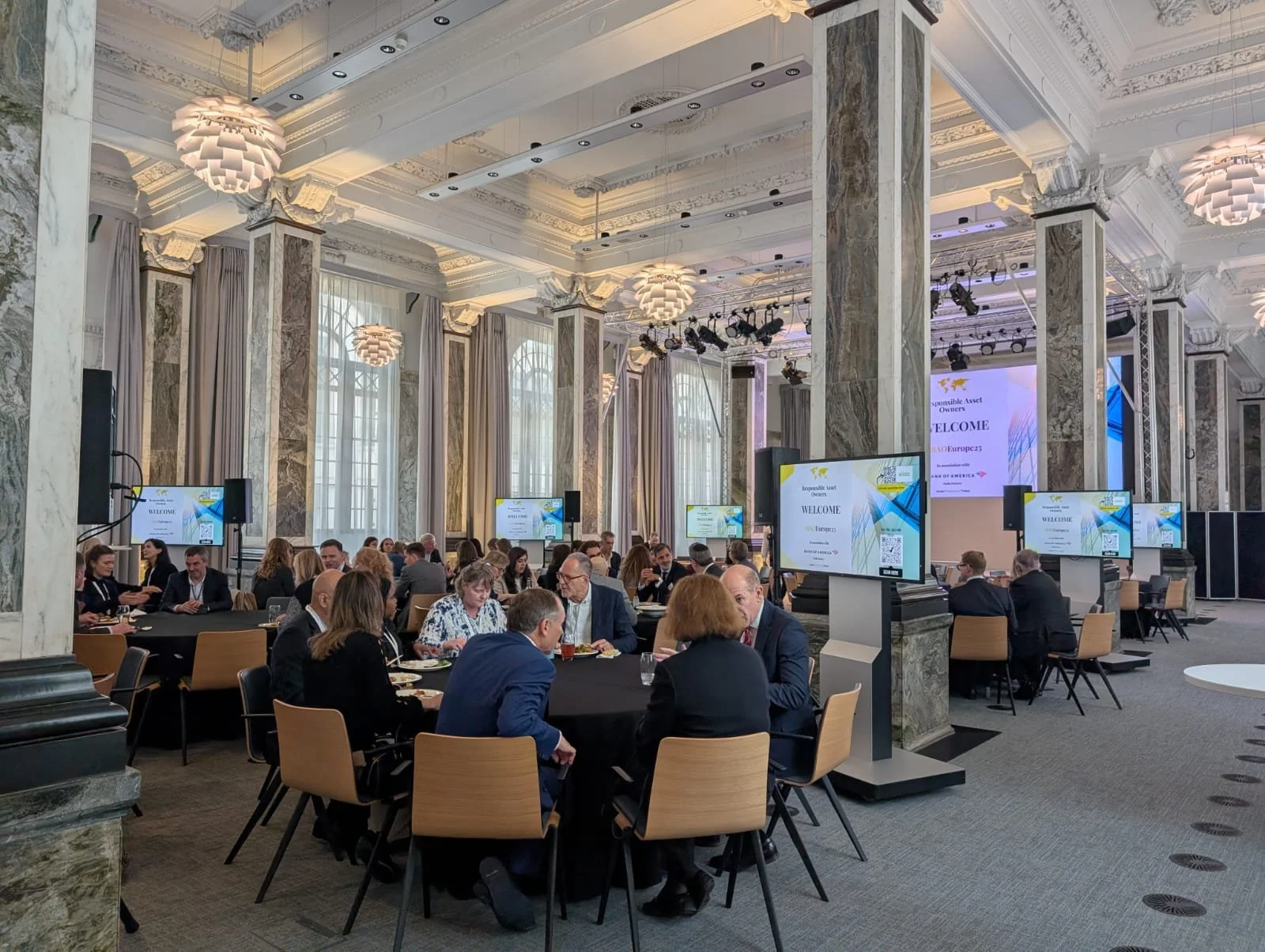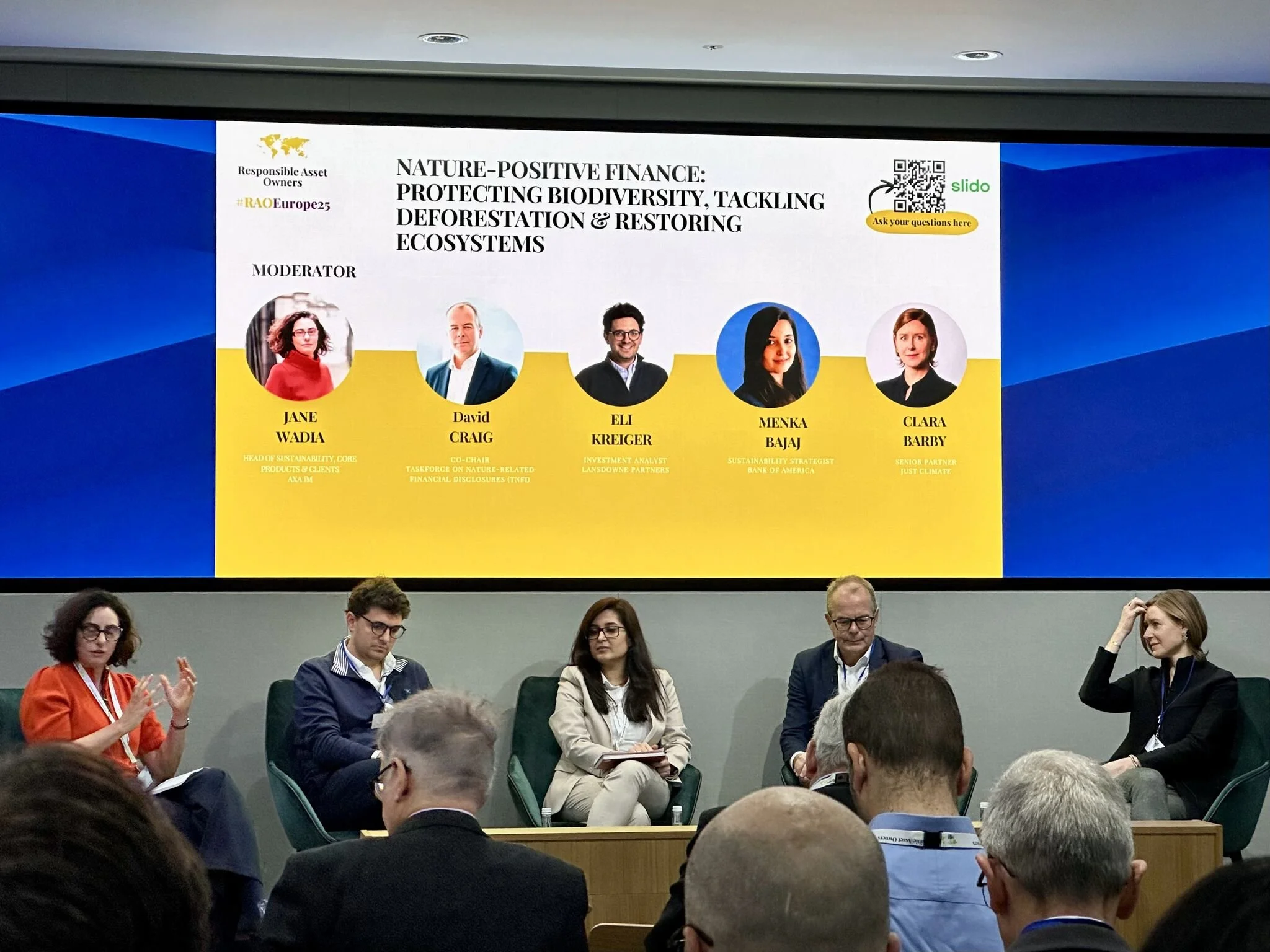Leadership in practice….
From shifting geopolitics to the rise of responsible AI, RAOEurope25 — in Association with Bank of America — brought together leaders from across finance, policy, and sustainability to explore how capital can drive resilience in uncertain times.
The day was packed with insight, debate, and optimism — proving that collaboration, courage, and clear purpose remain the strongest currencies in a volatile world. And the setting for lunch was a pretty impressive backdrop for conversations to continue…….
The opening session of #RAOEurope25 plunged straight into the urgent question: how investors can mobilise capital for biodiversity, deforestation prevention, and ecosystem restoration?
🌿 Nature-Positive Finance: Investing in Biodiversity, Deforestation & Ecosystems
Moderated by Jane Wadia, the opening panel of RAOEurope25 set the tone for the day with a powerful discussion on how finance must evolve to protect — and restore — the natural systems that underpin the global economy.
Featuring Clara Barby, Menka Bajaj, David Craig, and Eli Krieger, the conversation explored the emerging frameworks that are bringing biodiversity, deforestation, and ecosystem health into mainstream investment thinking.
Speakers emphasised that the financial community can no longer treat nature as an externality. Natural capital risk is financial risk, and the institutions that recognise this first will be the ones best positioned for long-term value creation.
The panel discussed practical pathways for integrating nature-related disclosures, biodiversity metrics, and deforestation screening into investment processes. They also highlighted the rise of nature credit markets and the role of policy in unlocking scalable solutions.
As Clara Barby noted, “Protecting ecosystems isn’t charity — it’s strategy.” The audience left with a clear message: a nature-positive economy isn’t just good for the planet — it’s essential for resilient portfolios and sustainable growth.
🤖 Keynote: The Data & AI Revolution – Enhancing Insights & Investment Decisions
Delivered by Haim Israel, this keynote captivated the audience and set a powerful tone for the day. His central message — “Data is the new DNA of Investing, but only if we use it responsibly” — resonated throughout the discussions that followed.
Haim explored how AI and advanced analytics are transforming the way investors assess risks and opportunities, bringing transparency and precision to responsible integration. He demonstrated that when used ethically, AI can uncover insights hidden in complexity — identifying correlations between capital allocation, corporate behaviour, and social or environmental outcomes.
But his message came with a challenge: technology alone isn’t the answer. Without governance, accountability, and human oversight, data-driven investing risks becoming a mirror of our existing biases. The audience was struck by his compelling message that the AI revolution must also be a responsibility revolution — one that balances innovation with integrity.
It was a gripping reminder that the future of finance isn’t just about what we can do with technology, but what we choose to do with it. To find our more about the challenges & opportunities Bank of America see in this key area, there are some excellent downloads available here.
💡 Impact Investing: Measuring Real-World Outcomes Beyond Financial Returns
Moderated by Arun Kelshiker, with a powerhouse panel of Mike Weston, Frances Deakin, Ioannis Ioannou, and Cliff Prior - a brilliant stand in for Gail Le Coz unfortunately taken ill at the last minute - this session unpacked one of the most critical questions in sustainable finance:
How do we prove that capital truly drives real-world change?
The discussion made it clear that as impact investing matures, investors are demanding more than good intentions — they want robust evidence. The panel explored how to measure and verify social and environmental outcomes with credibility and consistency, while balancing the constant tension between rigour and practicality.
Speakers compared approaches to impact verification, from data-driven evaluation frameworks to on-the-ground assurance processes that guard against impact-washing. The debate was frank, forward-looking, and refreshingly pragmatic.
As Ioannis Ioannou observed, “Impact without evidence is just aspiration.”
The key takeaway: impact investing is moving from storytelling to accountability. The next generation of responsible investors will be those who can prove their impact — not just promise it.
🌍 Geopolitics & Portfolio Resilience
In an increasingly unpredictable world, resilience has become one of the most valuable commodities in finance. During this insightful discussion, Alexandra Danielsson, Mark Hill, Naomi Clark, and Andy Howard agreed that resilience isn’t just about hedging risk — it’s about building systems that can adapt, seize opportunity, and think beyond the immediate horizon.
They explored how investors can navigate geopolitical fragmentation and economic volatility by broadening their scope of reference — considering energy security, supply chain alignment, policy shifts, and social stability as integral to portfolio strategy.
The takeaway was clear: resilience is no longer reactive — it’s strategic, forward-looking, and fundamental to long-term performance.
🤖 Tech Transition & Responsible AI: Investing in the Future (Ethically & Sustainably)
Moderated by Tony Langham, this forward-looking panel brought together Xavier Le Mene, Juliette Gerstein, Toby Belsom, and Josh Gilbert (ISS STOXX) for a fascinating exploration of how AI and technology are reshaping the future of sustainable investment.
The discussion struck a balance between optimism and caution. On one hand, the opportunities are vast: data-driven insight, predictive analytics, and automation can help investors assess ESG risks and opportunities with unprecedented clarity. On the other, the panel warned that without ethical frameworks, the same tools could amplify bias, opacity, and greenwashing.
The message was crystal clear: innovation without integrity is just acceleration in the wrong direction. Speakers emphasised the need for investors to take an active role in ensuring that technology serves transparency, fairness, and long-term value creation. As one panellist put it, “AI might power the future — but responsibility will define it.” And Josh Gilbert invite the audience to reach out to him directly to find out more about how different platforms evaluated both risk and opportunity. If you weren’t there and would like to know more, send us your details and we’ll make the connection for you: Admin@RAOGlobal.org
🧭 Stewardship & Influence: Driving Systemic Change Through Active Ownership
Moderated by the always provocative Rory Sullivan, with insightful contributions from Catherine Howarth, David Atkin, Sheila Stefani, and Georgia Stewart, this session brought the concept of stewardship sharply into focus.
The panel agreed that stewardship has evolved far beyond engagement letters and policy checklists — it’s now the defining lever for systemic change. Through active ownership, investors can influence company behaviour, shape market norms, and drive long-term impact that extends beyond individual holdings.
Discussions covered how to embed stewardship at every level — from investment mandates to board accountability — and how to collaborate across asset classes to amplify influence. As one panellist noted, “If capital has a voice, stewardship is how we choose to use it.”
The tone of the session was clear and confident: the future of responsible investment depends on investors who engage not just with companies — but with the systems those companies operate within.
🌍 Climate & Capital: Accelerating Decarbonisation in a Volatile Economy
Moderated by Marian D’Auria this high-energy panel — featuring Ulrik Fugman, Claire Meier, Richard Folland, and Paul Horrocks dialling in from Paris and tackled one of the biggest questions of our time: how can investors accelerate decarbonisation when the global economy is anything but stable?
The conversation explored the realities of financing the transition — from managing carbon exposure and policy risk to identifying growth in new energy and industrial innovation. Panelists agreed that waiting for perfect policy certainty is no longer an option; investors must act decisively, balancing opportunity with accountability.
There was clear consensus that capital allocation is shifting from a “carbon-light” preference to a transition-focused strategy — one that rewards credible pathways, transparent metrics, and genuine systems thinking.
As one delegate put it, “decarbonisation isn’t a moral statement — it’s an investment strategy.”
After a much needed coffee break - which was a delicious afternoon tea, complete with scones, cream and jam - everyone resumed their position for the final panel discussion….
🧑🤝🧑 The “S” Factor: Human Capital, Social Equity & Just Transition Investing
Moderated by Mandy Kirby, with expert insights from Amanda Latham, Paul Chandler and William Scholes this final session explored how the social dimension of ESG — too often overshadowed by its environmental counterpart — is now taking centre stage.
The discussion centred on human capital, workforce wellbeing, diversity, and the just transition — areas that define not only corporate performance but also societal resilience. Speakers highlighted that the “S” factor is no longer soft; it’s strategic. In a world of automation, climate migration, and shifting labour dynamics, companies that invest in people are investing in performance.
The panel urged investors to look beyond compliance to connection — engaging with companies on workforce culture, community impact, and equitable transition planning.
As Amanda Latham succinctly put it, “If E and G are the structure, S is the soul.”
The audience left with one unmistakable takeaway: social sustainability is the bridge between responsible investment and real-world progress.
🌟 Closing Reflections: Responsibility as Leadership
As RAOEurope25, held in association with Bank of America, drew to a close, one theme echoed across every conversation: responsibility and leadership are now inseparable.
From nature-positive finance to impact measurement, from responsible AI to stewardship and the social transition, every panel revealed the same truth — capital is no longer passive. It shapes outcomes, systems, and societies.
Delegates agreed that in an age of geopolitical tension and technological acceleration, the most resilient investors are those who combine clarity of purpose with courage of action.
RAOEurope25 once again proved itself as the meeting place for leaders ready to face that challenge — where diverse voices converge not just to discuss change, but to drive it.
A heartfelt thank you to our hosts, Bank of America, to our sponsors including ISS STOXX, to every speaker who shared their insight and experience, and to the delegates whose engagement made this year’s event so dynamic and impactful.
As we look ahead, one message stands out: Responsible investment isn’t a trend — it’s the foundation of future leadership.
Until next year — thank you for being part of the RAO community shaping that future.
See photos here


